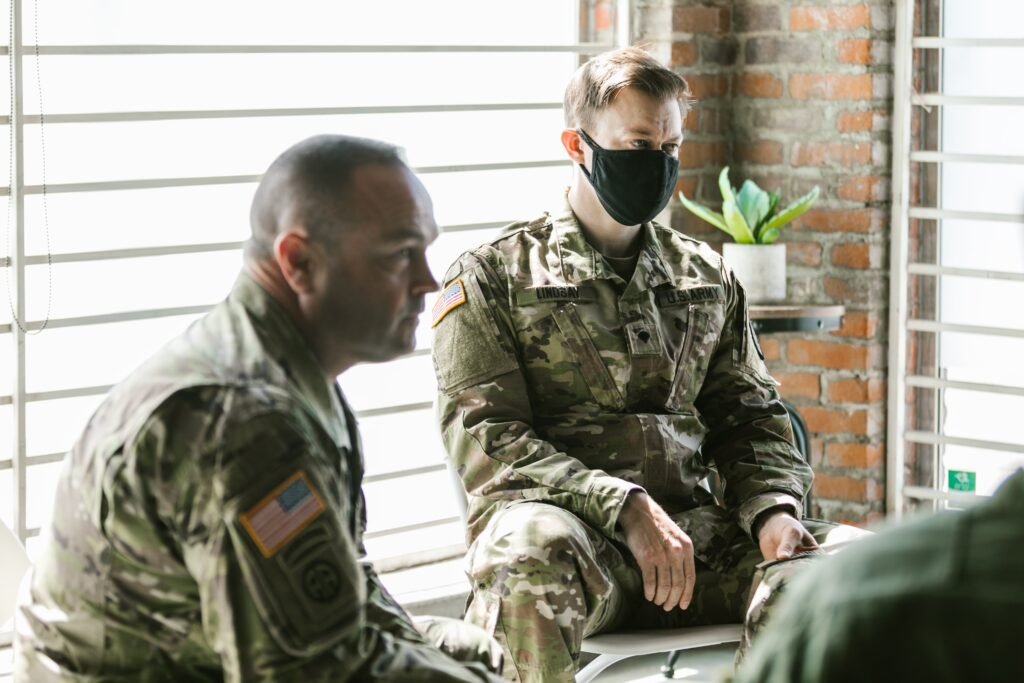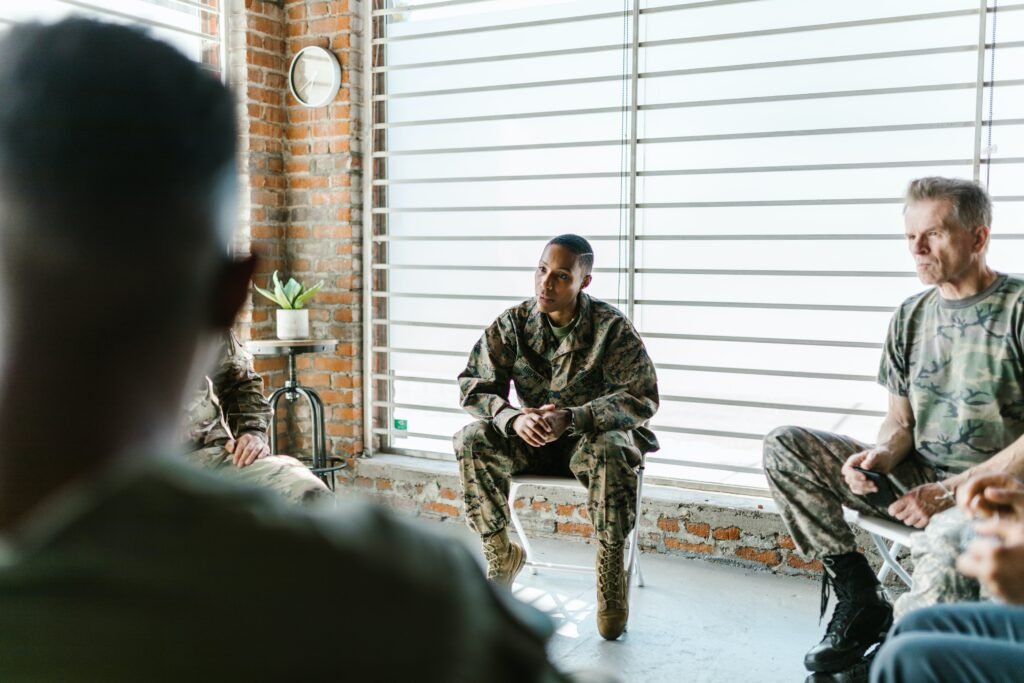Embarking on the journey toward healing from PTSD, you’re not alone in your quest. “Navigating PTSD Treatment for Veterans” shines a light on pathways to wellness designed specifically for those who’ve bravely served. This empowering guide not only walks you through the essential steps to access the much-needed treatment but also connects you with a community that understands deeply the sacrifices you’ve made. It’s your time to reclaim your strength and discover the myriad of opportunities awaiting you on the other side of service. With a wealth of resources, from demystifying benefits to finding comprehensive mental health support, this guide is your ally in building a rewarding life beyond the battlefield.
Understanding PTSD in Veterans
The path from the battlefield back to civilian life is strewn with various challenges, among which mental health stands front and center. Understanding Post-Traumatic Stress Disorder (PTSD) in veterans is the first step towards healing and adaptation. Here, we break down the basics, from what PTSD is to its profound effects on veterans’ lives.
Definition of PTSD
PTSD is a mental health condition triggered by experiencing or witnessing a terrifying event. For many veterans, combat situations, exposure to life-threatening scenarios, and the loss of comrades can lead to PTSD. This condition is characterized by intense, disturbing thoughts and feelings related to their experiences that last long after the traumatic events have ended.
Common triggers of PTSD in military service
In the military context, common triggers include combat exposure, IED blasts, injuries, sexual assault during service, and witnessing death or severe harm to others. The unpredictability and intensity of these experiences can deeply imprint on an individual’s psyche.
Symptoms and diagnosis criteria
Symptoms of PTSD in veterans may include flashbacks, nightmares, severe anxiety, and uncontrollable thoughts about the traumatic event. To be formally diagnosed, symptoms must cause significant distress or impairment in social, occupational, or other important areas of functioning and persist for more than a month.
The impact of PTSD on veterans’ life and relationships
The ripple effects of PTSD touch many aspects of a veteran’s life, disrupting relationships, employment, and daily activities. The isolation it often brings can strain friendships and family relations, making social reintegration challenging.
The Importance of Seeking Treatment
Addressing PTSD is crucial, not only for the individual’s well-being but for their families and communities. Here’s why seeking treatment early and combating stigma is essential.
Consequences of untreated PTSD
Untreated PTSD can lead to a range of negative outcomes, including substance abuse, depression, anxiety, and suicidal ideation. It can severely impair a veteran’s ability to function in society and maintain healthy relationships.
Benefits of early diagnosis and treatment
Early intervention can mitigate the severity of symptoms, help prevent comorbid conditions, and improve overall quality of life. Recognizing signs and seeking help promptly can make a significant difference in recovery outcomes.
Overcoming stigma associated with mental health in the military community
There’s a critical need to address and dismantle the stigma around PTSD and mental health within the military and veteran communities. Encouraging open conversations and education can foster a more supportive environment for seeking help.

This image is property of images.pexels.com.
Types of PTSD Treatment Available for Veterans
Multiple avenues exist for treating PTSD, ranging from traditional therapies to innovative approaches that offer hope and healing.
Evidence-based psychotherapies
Cognitive Behavioral Therapy (CBT), including specific modalities like Prolonged Exposure (PE) Therapy and Cognitive Processing Therapy (CPT), has shown effectiveness in treating PTSD. These therapies involve working through traumatic memories and changing unhelpful patterns of thought.
Medication options and management
Antidepressants, particularly Selective Serotonin Reuptake Inhibitors (SSRIs), are commonly prescribed to help alleviate symptoms of PTSD. Medication can be an essential part of a comprehensive treatment plan.
Emerging treatments and therapies
Recent years have seen the introduction of innovative therapies such as Eye Movement Desensitization and Reprocessing (EMDR) and the use of Virtual Reality (VR) for exposure therapy. These emerging treatments offer alternative avenues for veterans seeking relief.
Holistic and alternative approaches
Holistic treatments like yoga, meditation, and acupuncture are gaining traction as complementary therapies in managing PTSD symptoms. These approaches can enhance well-being and support other treatments.
Navigating VA Benefits and Services
The Veterans Affairs (VA) system offers a wide range of benefits and services designed to support the mental health of veterans. Here’s how to make the most of them.
Overview of VA healthcare benefits
Veterans are entitled to comprehensive healthcare benefits, including mental health services. This covers counseling, therapy, medication management, and specialized PTSD programs.
How to access mental health services through the VA
Accessing mental health services starts with enrollment in VA health care, for which you can apply online, in person, or by mail. Following an assessment, the VA will connect you with the appropriate services.
Understanding eligibility and enrollment process
Eligibility for VA health care depends on factors like your length of service, discharge status, and service-related injuries or conditions. Navigating this process can be complex, but resources are available to help.
Resources for appealing decisions and advocacy
If you face hurdles in accessing benefits or disagree with the VA’s decisions, don’t despair. Numerous resources and advocacy groups can assist you in appealing decisions and getting the support you need.

This image is property of images.pexels.com.
Finding the Right Healthcare Provider
The journey to recovery is personal, and finding the right healthcare provider is key. Here are some considerations to help you make informed choices.
Criteria for choosing a PTSD specialist
Look for providers with experience in treating veterans and specific training in PTSD. Specialists who understand military culture and the unique challenges faced by veterans can offer more tailored care.
The role of primary care providers in managing PTSD
Primary care providers play a crucial role in identifying symptoms early, providing initial care, and referring veterans to specialized services. They can be an invaluable ally in your treatment journey.
Utilizing the VA’s provider network
The VA offers an extensive network of care providers specializing in PTSD. Taking advantage of this network can ensure you receive comprehensive, veteran-focused care.
Seeking care outside the VA system
Some veterans choose to seek care outside the VA, either due to preference or logistics. In such cases, looking for providers who accept VA benefits or exploring private insurance options can be beneficial.
Coping Strategies and Self-Help
Beyond formal treatment, self-care and coping strategies play a vital role in managing PTSD symptoms. Here’s how to build a toolkit for resilience.
Developing a personal coping strategy
Identify activities and practices that enhance your well-being and incorporate them into your routine. This might include physical exercise, hobbies, or spending time with loved ones.
Self-help tools and resources
A wealth of self-help books, apps, and online resources focus on PTSD and mental health. These can be valuable supplements to your treatment and recovery efforts.
The role of exercise, diet, and sleep in managing PTSD
Taking care of your body is crucial for mental health. Regular exercise, a balanced diet, and adequate sleep can significantly impact your mood and stress levels.
Mindfulness and relaxation techniques
Practices such as mindfulness meditation, yoga, and deep-breathing exercises can help manage anxiety and promote relaxation, offering practical tools for dealing with stress and flashbacks.

This image is property of images.pexels.com.
Support Systems for Veterans with PTSD
No veteran should navigate the challenges of PTSD alone. Building a robust support network is crucial for healing and resilience.
Building a support network with family and friends
Encourage open communication with your loved ones about your needs and experiences. Educating them about PTSD can also foster understanding and support.
Veteran support groups and organizations
Connecting with fellow veterans who understand first-hand the challenges of PTSD can be incredibly validating and supportive. Many organizations and support groups offer a sense of community and shared experience.
Peer support and mentorship programs
Peer support programs connect veterans with others who have been through similar experiences and can offer guidance, mentorship, and understanding in ways that only those who’ve “been there” truly can.
Online communities and forums
Digital platforms offer another layer of support, allowing veterans to share experiences, advice, and encouragement anonymously or from the comfort of their homes.
Challenges in PTSD Treatment
While treatment can be highly effective, veterans may face various challenges in accessing and sticking with their treatment plans.
Barriers to accessing care
Logistical barriers, like location and transportation, along with psychological hurdles such as stigma and fear of negative career impacts, can deter veterans from seeking help.
Issues with treatment compliance and dropout
Staying engaged in treatment can be difficult, especially in the face of life’s other pressures. Tailoring approaches to each individual’s needs and preferences can help improve compliance and outcomes.
Managing comorbid conditions and substance use
Many veterans with PTSD also struggle with other mental health conditions or substance use, which can complicate treatment. A comprehensive, integrated approach to care is necessary to address these intertwined issues.
Addressing chronicity and treatment-resistant PTSD
Some veterans may not fully respond to initial treatments or may experience chronic PTSD. Exploring alternative or adjunctive treatments, including emerging therapies, can provide hope for those facing these challenges.

Success Stories and Veteran Testimonials
Amid the struggles, many veterans have successfully navigated PTSD treatment and emerged with newfound strength and purpose. Their stories offer inspiration and hope.
Real-life stories of overcoming PTSD
Hearing about others who’ve successfully managed their PTSD can be incredibly motivating. These stories highlight the possibilities for recovery and a fulfilling life post-treatment.
How treatment has changed veterans’ lives
Veterans who’ve gone through treatment often speak of how it has transformed their relationships, outlook, and overall well-being. These changes underscore the profound impact of seeking and receiving help.
Lessons learned through the recovery process
The journey through PTSD treatment teaches valuable lessons about resilience, self-compassion, and the importance of support. Sharing these insights can guide and encourage others on their paths to recovery.
The importance of perseverance and hope
Recovery from PTSD is often a long and challenging road, but the stories of those who’ve faced these challenges head-on remind us that perseverance and hope can lead to remarkable outcomes.
Moving Forward: Life After PTSD Treatment
Life after PTSD treatment holds countless opportunities for growth, connection, and fulfillment. Here’s a look at what lies beyond the treatment journey.
Reintegration into civilian life
Transitioning back to civilian life after treatment involves re-establishing routines, pursuing career or educational goals, and finding new ways to contribute to your community. This phase can be an opportunity for profound personal development.
Maintaining mental health after treatment
Keeping up with self-care practices, continuing therapy or support groups as needed, and staying mindful of triggers can help maintain mental health gains made during treatment.
Finding purpose and engagement post-service
Many veterans discover new passions, career paths, or ways to serve others that bring a sense of purpose and satisfaction. Exploring different interests and opportunities can open up a new chapter in your life.
Continued support and follow-up care options
Staying connected with healthcare providers and support networks ensures you have the resources and support needed to navigate any future challenges. Regular check-ins and ongoing care can help sustain progress and address any setbacks.
The journey through understanding, treating, and overcoming PTSD is deeply personal yet universally impactful among veterans. By embracing the available resources, support, and treatment options, there’s hope and potential for a fulfilling life beyond the shadow of trauma. Remember, no veteran stands alone.

